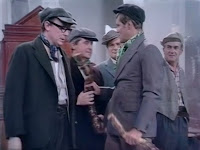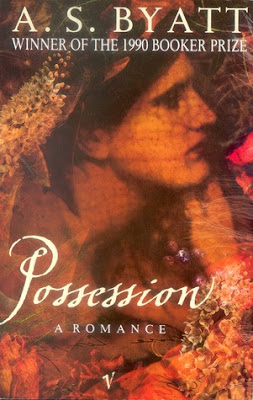as evoked by
A.S. Byatt - Possession: a Romance (5***)
The novel, Possession, evokes for me exactly what it was like to carry out research before the
age of the internet, when we had to go to libraries to look things up in books and
journals, and even use primary sources. More on this below.
It may also be the cleverest novel I have ever read: in fact I read it twice, partly because I enjoyed it so much and partly because a lot of it went over my head the first time through.
To describe the book first, the plot concerns two nineteen-eighties scholars who discover correspondence between two fictional Victorian poets revealing a previously unknown love affair. It is a discovery of immense historical significance, akin, say, to finding revelatory private correspondence by major literary figures such as Alfred Lord Tennyson or Christina Rossetti. As the two present-day scholars investigate the lives of the poets, they themselves are drawn into a relationship echoing that of the two Victorians. The two stories are revealed in parallel through five hundred pages of narrative, fictional poetry, letters, journals and diaries. So as well as the two love stories, and a cracking mystery story, A. S. Byatt has created substantial bodies of work attributed to the fictional poets and numerous pieces of writing attributed to other characters.
I struggled the first time through because: (i) the Victorian setting is rich in classical, biblical, literary and contemporary references of the kind with which educated Victorians of the time would have been very familiar but most of us today are not; and (ii) the nineteen-eighties setting alludes to numerous arcane and specialist approaches to textual analysis and criticism; e.g. we learn one of the scholars is trained in post-structuralist deconstruction. It found my own education sorely lacking.
Some might say the author is simply showing off, but essentially she is poking fun, and is abundantly able to do so because of her sweeping knowledge of Victorian and modern scholarship, poetry and literature. Some might say this is self-indulgent, but surely that is what all writers are. Her descriptions of beautiful things are dazzling, be they Victorian bathrooms, snowfall, the North York Moors or libraries. The 1990 Booker judges were clearly impressed.
That she put this sumptuous book together before 1990, before the internet, makes the achievement all the more impressive. She has not simply googled a tapestry of ideas and stitched them in, it stems from a lifetime’s study and expertise.
And that is what Possession strongly evokes for me: the pleasure and excitement of academic work before the age of abundant electronic resources and the internet. Anyone whose university days predated the turn of the century, perhaps researching a thesis or dissertation, or a final-year project, will find Possession brings it all back. You feel as if you are researching the Victorian poets yourself.
For me it was the light and quiet in a corner of the top floor of the Brynmor Jones Library at Hull, looking through the raked windows across the city to the distant Humber where bogies high above the river crossed slowly back and forth spinning the Humber Bridge suspension cables. Later it was the darkness and claustrophobia of the open stacks deep in the bowels of the John Rylands Library at Manchester.
The silence; the decades of collected journals; the Dewey Decimal index; the chance discovery of a promising book next to the one you were looking for; deliberately mis-shelving books so that no one else can deny you them the next day (I plead guilty, but I never stole anything, unlike one of the scholars in Possession); pages of handwritten notes from volumes piled six or seven high on your desk; coloured pens and paper clips, sore fingers; treasure-trails through the impenetrable Science and Social Sciences Citation Indexes (the SCI and SSCI); flip-lidded index card boxes; inter-library loans; journal offprint requests; scratchy, smelly, chemical photocopies; microfilm readers; hours following leads and loose ends which led to nowhere; puzzling new words and terminology in need of clarification; flashes of insight on encountering new ideas and making what you hoped, but rarely were, entirely original associations. More than anything else, the Csikszentmihalyian sense of flow: the buzz of your own thoughts, total immersion in the task at hand, suspended in time so that nothing else seemed to matter.
Through the nineteen-nineties things gradually changed. It became possible to research whole topics instantly and with plausible thoroughness through just a screen in an austere book-free room. Things were never the same again. I was still recommending books for my courses into the new century, but in rapidly changing subject areas such as computing, and even the social sciences, some of the university lecturers I knew stopped using print sources completely.
I hung on to my collection of academic books until retirement when they had to go. I kept a few that no one wanted, and ones that had once been especially useful and dear to me.
Key to star ratings: 5*** wonderful and hope to read again, 5* wonderful, 4* enjoyed it a lot and would recommend, 3* enjoyable/interesting, 2* didn't enjoy, 1* gave up.
Google Analytics
Friday 11 January 2019
Thursday 27 December 2018
The Morecambe and Wise IRA Sketch
It’s hard to believe what I saw on television last night: two Morecambe and Wise shows from 1968, believed lost, recovered from a forgotten film canister found in a cinema in Sierra Leone, and broadcast now for the first time in over fifty years.
 |
| Ronnie Carroll hands out the shillelaghs |
The writing, the timing, the general silliness – it’s one of the funniest things I’ve seen for some time, but can you imagine anyone on television today daring to make fun of the Irish Republican Army and speak in a mock Irish accent? Admittedly, the show was originally broadcast before the riots in 1969 and subsequent deployment of British troops, but even so, would it not today be greeted by howling accusations of bad taste, political incorrectness and even xenophobia, and taken off air?
My children have applied for Irish nationality. They can because my wife’s father was born in Bray near Dublin. They are fearful of losing their right to work and travel freely throughout Europe after Brexit. The likely outcome is that all the family except me will be Europeans, and that I will have to pay for a permit to set foot across the Channel.
Their applications required extensive supporting documentation – identity documents, witness statements, ancestral birth, marriage and death certificates, and large cheques – which took quite some time to put together. If all you had to do was to be able say “Top of the morning” in a pantomime Irish accent, dance a jig and set out for Tipperary with me shillelagh under me arm and a twinkle in me eye, I might have had an outside chance of getting in. ‘Tis a shame, to be sure, bejabers!
The Morecambe and Wise Show: The Lost Tapes is available on BBC iPlayer for the next month:
https://www.bbc.co.uk/programmes/b0bxc158 is the episode described above with guest Ronnie Carroll.
https://www.bbc.co.uk/programmes/b0bx04tl is another episode introduced by Michael Aspel who appears as guest on the show.
[addendum: they were repeated on Christmas Eve 2019 and available again for another month]
* Shillelagh: an Irish word for a stout wooden cudgel, immortalised in a song by Bing Crosby who had an Irish grandmother and released L.P.s full of sentimental songs with Irish themes, e.g. https://www.youtube.com/watch?v=KnVPXf2_ZGY
Subscribe to:
Posts (Atom)




